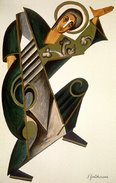Is Islam inherently unable to accomodate modernism?
City Journal Spring 2004 | When Islam Breaks Down by Theodore Dalrymple: "Unlike Christianity, which had to spend its first centuries developing institutions clandestinely and so from the outset clearly had to separate church from state, Islam was from its inception both church and state, one and indivisible, with no possible distinction between temporal and religious authority. Muhammad’s power was seamlessly spiritual and secular (although the latter grew ultimately out of the former), and he bequeathed this model to his followers. Since he was, by Islamic definition, the last prophet of God upon earth, his was a political model whose perfection could not be challenged or questioned without the total abandonment of the pretensions of the entire religion.
But his model left Islam with two intractable problems. One was political. Muhammad unfortunately bequeathed no institutional arrangements by which his successors in the role of omnicompetent ruler could be chosen (and, of course, a schism occurred immediately after the Prophet’s death, with some—today’s Sunnites—following his father-in-law, and some—today’s Shi’ites—his son-in-law). Compounding this difficulty, the legitimacy of temporal power could always be challenged by those who, citing Muhammad’s spiritual role, claimed greater religious purity or authority; the fanatic in Islam is always at a moral advantage vis-à-vis the moderate. Moreover, Islam—in which the mosque is a meetinghouse, not an institutional church—has no established, anointed ecclesiastical hierarchy to decide such claims authoritatively. With political power constantly liable to challenge from the pious, or the allegedly pious, tyranny becomes the only guarantor of stability, and assassination the only means of reform."

No comments:
Post a Comment